The Rise of Serge Ibaka
How Toronto Raptor Serge Ibaka survived poverty in Congo and rose to NBA stardom.
photography Geoff Fitzgerald
City Life enjoyed an exciting evening when we visited the swanky hotel and residence One King West to meet one of the city’s most celebrated athletes, Serge Ibaka of the Toronto Raptors, for an exclusive. We set up our cameras and our team of stylists in the hotel’s impressive Fifteen Hundred penthouse suite. Upon the arrival of “Mr. Avec Classe,” the first thing that struck us was Ibaka’s grand stature, at 6-10, 235 pounds and 28 years of age. Behind his commanding presence and designer gear is a compelling story of survival and hope.
His story begins in Brazzaville in the Republic of the Congo, in humble beginnings a world away from the fast-paced, glamorous life the NBA power forward now lives. Ibaka’s childhood of poverty and struggle would be the driving force behind his relentless motivation to succeed.
Ibaka has chilling memories of his youth, in circumstances so adverse that children like himself were experiencing malnutrition and had to sell water on the streets to support themselves and their families — but often it wasn’t enough. Ibaka’s harsh reality was one of scarcity, at one time being homeless without a bed, food or clean water.
But amidst the hardship, young Ibaka was aware of his talents and, moreover, of the opportunities his talent opened up for him. He made a vow to himself: “The way things are right now, I need to go play basketball abroad. Until there is nothing else I can do, I will never stop trying.”
It helped that basketball ran deep in Ibaka’s blood. Both his mother and his father played for national basketball teams — his father for the Republic of Congo, his mother for the Democratic Republic of Congo. Like most parents who see potential in their children, Ibaka’s parents encouraged him to pursue his dreams from a young age.
“My father was a big inspiration because he was a basketball player, too. He was hard on me and pushed me a little bit, but he didn’t pressure me to play, as basketball runs in our family’s veins,” says Ibaka.
Basketball served a deeper purpose as not just a sport, but also an escape when Ibaka experienced a series of losses in his life. First came his mother’s untimely death, when Ibaka was eight years old. Soon after, the brewing civil unrest in the country boiled over into the bloody Second Congo War. The family fled the city for most of the war, but on their return to Brazzaville, Ibaka’s father was arrested for straying on the wrong side of the battlefield. During his father’s year-long imprisonment, Ibaka at first lived with uncles, but then was turned out to live on the street. Eventually, his grandmother took him in.
And Ibaka resumed his training in earnest. “If I didn’t wake up to go run, I wouldn’t be here right now. During those runs, while everyone else was sleeping, I knew I had to do something different from the rest to have a different future. People would make fun of me and tell me it was worthless. But in my mind, I always had a vision and a goal,” recalls Ibaka.
Ignoring the taunts of his peers, he woke at 4 a.m. every day to go for runs, despite his hunger, the lack of electricity and, sometimes, a lack of shoes. These runs defined Ibaka. Every morning as he embarked on his daily routine, listening to his feet pounding the pavement, he knew that with every step, he was building and shaping the basketball superstar he would become.
At the young age of 17, Ibaka made the move to Spain to play in the second division league, first with L’Hospitalet, then with DKV Joventut. In 2007, he was invited to participate in the Adidas Nations camp; this would be his big break and put him on the radar of the NBA scouts.
The pressure on Ibaka was intense. This was not only an important opportunity, but also a chance to care for his loved ones back home. “In Congo, when you leave to go somewhere else, everybody thinks that you are a millionaire already. A lot of people expected me to take care of them, so there was definitely pressure. But it was also a dream of mine to be able to provide a good life for my family.”
On June 26, 2008, Ibaka was selected as the Oklahoma Thunder’s 24th pick in that year’s NBA draft, becoming the first player from the Republic of Congo to be selected in the draft. He had a long career with the Oklahoma City Thunder (2009–16) and went on to play for the Orlando Magic (2016–17) before eventually signing a three-year contract with the Toronto Raptors on July 7, 2017, for a reported C$65 million.
“I felt a good connection with the team and the city right away since I arrived. I really enjoy Toronto. It has been a great fit for me because it’s a very multicultural city. Canadians have really embraced me, and I like how open and supportive the city and its people are. I love Toronto!”
Since then, Ibaka has become a household name in Toronto as one of the team’s star players. His transition to Toronto has been steady, and he is quickly adjusting to life in The Six. “I felt a good connection with the team and the city right away since I arrived. I really enjoy Toronto. It has been a great fit for me, because it’s a very multicultural city. Canadians have really embraced me, and I like how open and supportive the city and its people are. I love Toronto!” says Ibaka.
Ibaka is known for his skills on the court, but the public is quickly learning about another side of him. Philanthropy makes up a significant part of his legacy. Besides providing financial support to his family, Ibaka has made charitable work his life’s purpose, creating The Serge Ibaka Foundation, which aims to inspire children around the world to believe in themselves, even if they are growing up in difficult circumstances.
Ibaka is determined to help change lives back home in Congo and elsewhere in the world by using his own struggles and successes to inspire. “I started the Serge Ibaka Foundation because I felt I had to do something to help my people and others in need. Back in Congo, there are a lot of issues, and a lot of kids go through difficult times. I had many struggles as a child, which is why I want to focus on helping the youth. What lies ahead is a big project that we will soon announce, one which has been a lifelong dream of mine.”
Some of the foundation’s great achievements include working with UNICEF and partnering with the Starkey Hearing Foundation in the summers of 2014 and 2016 to provide hearing aids to children in Ibaka’s hometown of Brazzaville.
Ibaka says that, in light of his successes, he made a promise to himself and to God, to use his platform to help those less fortunate so that they, too, might overcome their challenges. He draws his strength from his long-standing faith, which also keeps him focused and humble in the face of the pressures and the notoriety that come with being a professional athlete.
“It’s all about never forgetting where you come from. Every day, I give thanks to God for the life he has given me, and I reflect on everything I have gone through. That is the key to living a balanced life. Enjoy what you have, but be aware that the most important things in life can’t be bought,” says Ibaka.
It’s hard to imagine that this athlete and philanthropist was once a child forced to live on the street for a time, while his father was a political prisoner. But Ibaka holds no resentment; rather, he chooses to avoid hostility and navigate his life with dignity and grace. His family relationships are strong and an integral part of his identity, as are his Congolese culture and its traditions.
“It’s all about never forgetting where you come from. Every day, I give thanks to God for the life he has given me, and I reflect on everything I have gone through. That is the key to living a balanced life. Enjoy what you have, but be aware that the most important things in life can’t be bought”
During our photo shoot for City Life, Ibaka swaps out our playlist for his own: Congolese music he enjoys dancing to with friends and family back home. (You can take the boy out of Congo, but you can’t take Congo out of the boy!) As we watch him move to the rhythms, one realizes that there is much to admire about Ibaka, but perhaps one of his most admirable traits is the way he embraces who he is, where he comes from and how he got here.
In part, this must be how he stays so grounded in contrast to some other NBA stars; if you have endured poverty, war, and the loss of parents as a child, you’re not likely to forget those painful memories. It is a credit to Ibaka that he chooses to let his story of struggle empower and educate others, particularly young people like his daughter Ranie.
When he talks about fatherhood, Ibaka visibly fills with pride in his daughter. “I couldn’t be happier to have [Ranie] in my life. I want her to never forget where she comes from and to appreciate what she has. She has seen how a lot of kids her age live in Congo. Luckily, she didn’t go through the things I went through as a kid, but she needs to be aware of her origins and to be thankful, all while figuring out how she, too, can help others.”
Ibaka is optimistic about the future. Never one to sit back and allow life to happen, he has always been the author of his own success, embracing opportunities that arise from his hard work and using his success to create new endeavours. This no-holds-barred approach to life drives him to keep learning, creating and bettering the world around him.
“What’s next for me is to keep being hungry for more, in basketball and in life. I want to be a better player every season and to win a championship with the Raptors. Off the court, I want to do more business ventures and contribute to society with my foundation,” Ibaka says.
At first glance, Serge Ibaka is an NBA powerhouse, nothing shy of the American Dream, with celebrity status, a lavish lifestyle and charm that are universally admired. But when he’s not Serge Ibaka the basketball player, he is Serge Ibaka the Son of Congo. It is an identity that he holds dear and does not take for granted. To the people of Congo, Ibaka is more than an NBA superstar; he is a symbol of hope. He is a force to be reckoned with, a symbol of survival and living proof that miracles do exist — we are the ones with the power to make them.
www.sergeibakafoundation.com
www.instagram.com/sergeibaka
FASHION CREDIT
Stylist – Ashley Galang | Make-up – Samantha Pickles
PHOTO 1: Breitling Watch – Chronomat 44 mm, 18-karat Rose Gold, Black Alligator Strap, Sauro Ring – 18-karat Rose Gold, 2.16-carat total Black Diamonds, 10-karat Yellow Gold Ring – 2.00-carat Diamonds, 14-karat White Gold Ring – 0.70-carat Diamonds, 14-karat Yellow Gold Ring – 1.30-carat Diamonds | JEWELRY provided by L’oro Jewellery, Gatto Gucci Bracelet, Gatto Gucci Chain, Swarovski Pendant Black, Baraka Bracelet with Diamond Speedometer| JEWELRY provided by Finch Centre Jewellers, Hat – Goorin Bros, Shirt – Guess
PHOTO 2: Turtleneck – Christopher Bates, Shirt – Joao Paulo Guedes, Jeans – Frank and Oak, Shoes – Parc City Boot
PHOTO 3: Watch – Hublot Classic Fusion King | JEWELRY provided by L’oro Jewellery, Suit – Thomas Henry Made, Pocket Square/Bowtie – Thomas Henry Made, Shirt – Guess
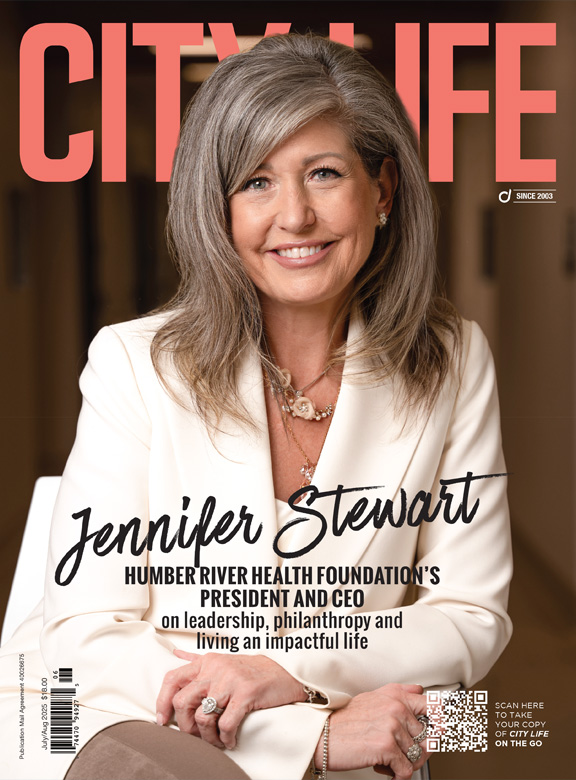








































































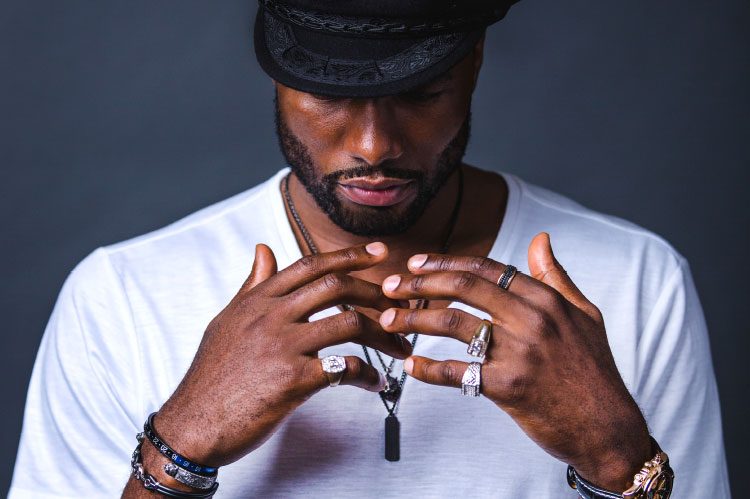
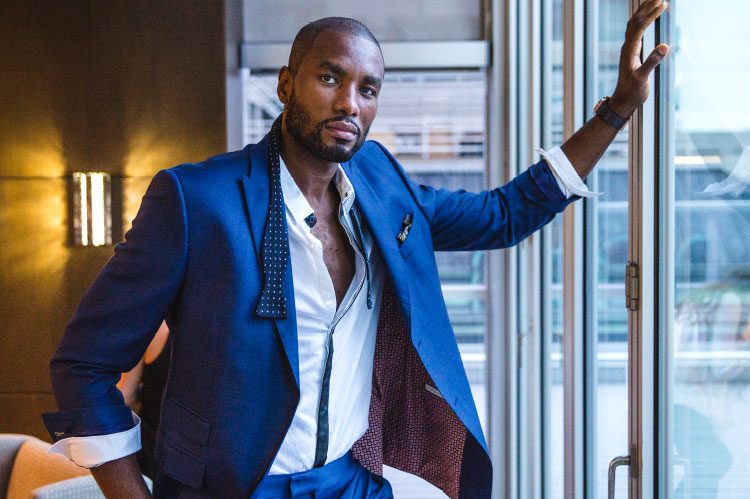
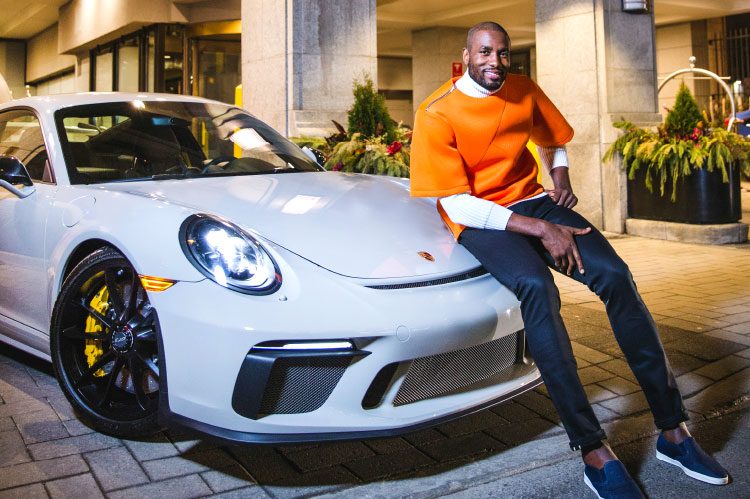
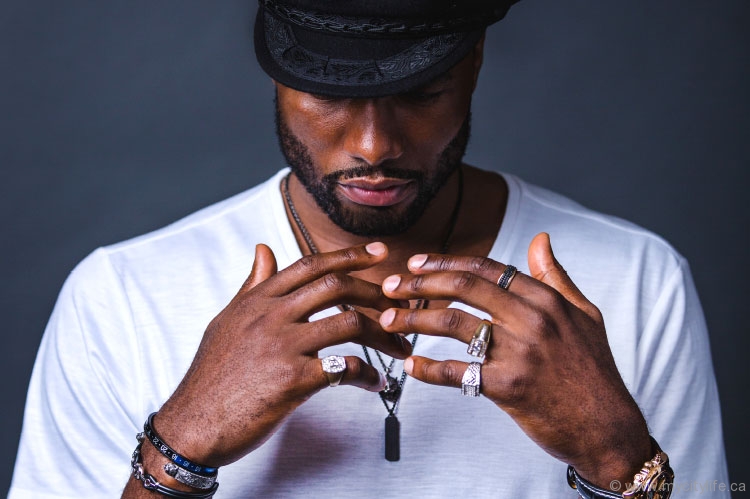






No Comment